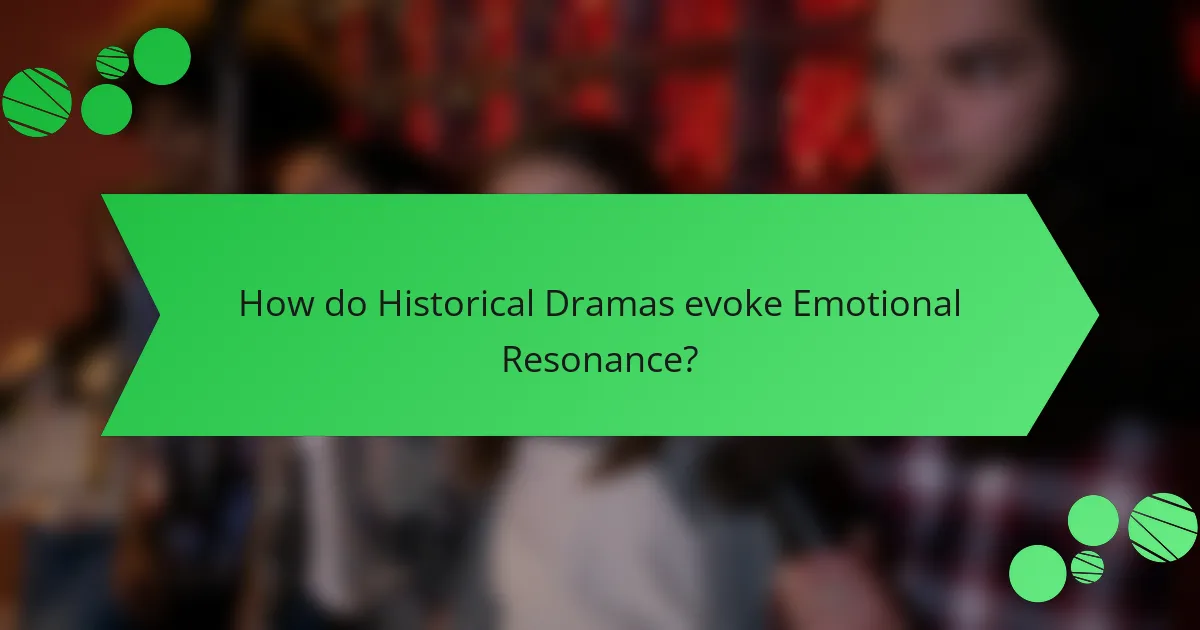
What are Historical Dramas and Why Do They Matter?
Historical dramas are a genre of film and television that portray events from the past. They often focus on significant historical figures, social issues, or cultural moments. These dramas aim to recreate historical settings with accuracy and detail. They matter because they provide insight into different eras and human experiences. Historical dramas can educate audiences about history in an engaging way. They also evoke emotional responses by connecting viewers to the past. For instance, films like “Schindler’s List” highlight the impact of historical events on individuals. These stories encourage reflection on societal values and lessons from history.
How do Historical Dramas differ from other genres?
Historical dramas differ from other genres primarily in their focus on real historical events and figures. They often emphasize accuracy in depicting the time period, settings, and cultural contexts. Unlike fantasy or science fiction, historical dramas are grounded in factual history. They aim to provide viewers with a deeper understanding of past societies and their complexities. Key figures in these dramas are based on actual individuals, enhancing the narrative’s authenticity. Emotional resonance is also a significant aspect, as these stories often explore human experiences during pivotal moments in history. This blend of fact and emotion distinguishes historical dramas from genres that prioritize imagination over reality.
What are the defining characteristics of Historical Dramas?
Historical dramas are characterized by their depiction of real events, people, and eras from the past. They often focus on significant historical events or figures, providing a narrative that blends fact with dramatization. Accuracy in setting, costumes, and dialogue is crucial for authenticity. Emotional resonance is commonly achieved through character development and personal stories within the historical context. These dramas frequently explore themes of conflict, power, and societal change. They aim to educate audiences while entertaining them, often invoking a sense of nostalgia or reflection on the past.
Why are Historical Dramas popular among audiences?
Historical dramas are popular among audiences due to their engaging storytelling and rich historical context. They often depict significant events and figures, providing viewers with a sense of connection to the past. Audiences appreciate the blend of entertainment and education that these dramas offer. The emotional resonance of personal stories set against historical backdrops captivates viewers. Additionally, high production values and skilled performances enhance the overall experience. According to a study by the University of Southern California, historical dramas can increase interest in history among viewers, making them more likely to seek out additional information. This combination of factors contributes to the enduring popularity of historical dramas.
What role does accuracy play in Historical Dramas?
Accuracy is crucial in historical dramas as it shapes the audience’s understanding of past events. It enhances credibility and engages viewers by providing a realistic portrayal of history. Accurate representations can foster a deeper emotional connection to the characters and their experiences. For instance, films like “Schindler’s List” depict real events, which can evoke strong emotional responses. Historical accuracy also educates audiences about significant figures and events, promoting awareness of cultural heritage. Furthermore, inaccuracies can lead to misconceptions and distortions of history, undermining the genre’s purpose. Therefore, accuracy serves as a foundational element that influences both the narrative and the audience’s reception.
How is historical accuracy measured in film and television?
Historical accuracy in film and television is measured by comparing the depicted events, characters, and settings to verified historical facts. This involves evaluating the fidelity of the portrayal against primary sources like documents, letters, and photographs. Experts in history often assess the accuracy of scripts and storylines. They consider the context of the depicted period, including social, political, and cultural aspects. Peer-reviewed studies, such as those published in the Journal of Historical Fiction, provide frameworks for evaluating accuracy. Audience reception also plays a role, as viewers may gauge authenticity based on their knowledge and research.
What are the consequences of inaccuracies in Historical Dramas?
Inaccuracies in historical dramas can lead to the distortion of public understanding of history. Viewers may form misconceptions about key events and figures. This can perpetuate stereotypes and misinformation. For instance, the portrayal of events in films like “Braveheart” has been criticized for historical inaccuracies. Such inaccuracies can diminish the perceived credibility of the genre. They may also influence educational perspectives on history. Additionally, inaccuracies can disrespect the individuals and cultures represented. This can result in a lack of engagement with authentic historical narratives. Overall, inaccuracies undermine the potential of historical dramas to educate and inform audiences.

Who are the Key Figures in Historical Dramas?
Key figures in historical dramas include prominent historical characters and influential leaders. These figures often represent real individuals from history, such as monarchs, military leaders, and cultural icons. Examples include figures like Cleopatra, Julius Caesar, and George Washington. Their portrayals aim to reflect their significant contributions and impact on history. Historical dramas often emphasize their personal struggles and triumphs. This adds depth and emotional resonance to the narrative. The accuracy of these depictions can vary based on creative interpretation. However, the essence of these key figures remains central to the storytelling.
What types of characters are commonly portrayed in Historical Dramas?
Historical dramas commonly portray characters such as royalty, soldiers, commoners, and revolutionaries. Royalty often includes kings, queens, and nobles, reflecting their power dynamics. Soldiers represent the military conflicts and struggles of the era, showcasing bravery and sacrifice. Commoners illustrate the everyday lives and challenges faced by the general populace. Revolutionaries embody the spirit of change and resistance against oppression. These character types help to represent the socio-political landscape of the time, enriching the narrative and providing context to historical events.
How do historical figures influence the narrative of a drama?
Historical figures shape the narrative of a drama by providing context and authenticity. Their real-life actions and characteristics serve as a foundation for character development. This connection enhances the emotional resonance of the story. Audiences relate to the struggles and triumphs of these figures. For instance, dramas based on figures like Abraham Lincoln or Cleopatra often explore their complexities. These portrayals can influence public perception of history. The accuracy of these depictions can vary, impacting the narrative’s credibility. Ultimately, historical figures serve as a bridge between past events and contemporary themes.
What are some notable portrayals of key historical figures?
Notable portrayals of key historical figures include Daniel Day-Lewis as Abraham Lincoln in “Lincoln.” This film depicts Lincoln’s efforts to pass the Thirteenth Amendment. Another significant portrayal is Meryl Streep as Margaret Thatcher in “The Iron Lady.” Streep’s performance captures Thatcher’s complex personality and political challenges. Additionally, Gary Oldman portrayed Winston Churchill in “Darkest Hour.” His depiction highlights Churchill’s leadership during World War II. These portrayals are recognized for their depth and accuracy in representing historical contexts. Each performance received critical acclaim and several awards, showcasing their impact on historical drama.
Why are certain historical events chosen for dramatization?
Certain historical events are chosen for dramatization due to their significant impact and emotional resonance. These events often involve pivotal moments in history that shaped societies or cultures. They may feature compelling narratives that engage audiences on a personal level. Additionally, events with well-known figures or dramatic conflicts attract interest. The portrayal of these events can enhance understanding of historical contexts. For example, the dramatization of World War II highlights themes of sacrifice and heroism. This approach can also spark discussions about contemporary issues. Ultimately, the combination of historical importance and emotional depth makes certain events ideal for dramatization.
What criteria do writers use to select events for Historical Dramas?
Writers select events for historical dramas based on relevance, emotional impact, and historical significance. Relevance ensures the event aligns with the themes of the narrative. Emotional impact involves choosing events that evoke strong feelings in the audience. Historical significance assesses the event’s importance in shaping society or culture. Writers often research primary sources and historical accounts to validate the authenticity of events. They also consider the availability of compelling characters and dramatic potential. By focusing on these criteria, writers create engaging and meaningful narratives.
How do cultural perspectives shape the selection of historical events?
Cultural perspectives significantly influence the selection of historical events. Different cultures prioritize events that resonate with their values and beliefs. For instance, Western narratives often emphasize individual heroism, while Eastern perspectives may focus on community and collective achievements. This selective emphasis shapes the interpretation of history. The portrayal of events can vary based on cultural context, leading to divergent historical narratives. For example, the American Revolution is framed as a fight for freedom in the U.S., while it may be viewed as colonial rebellion in other contexts. Additionally, cultural memory plays a role in which events are commemorated or forgotten. This selectivity can impact education and public discourse. Overall, cultural lenses determine which historical events are highlighted, shaping collective memory and identity.

How do Historical Dramas evoke Emotional Resonance?
Historical dramas evoke emotional resonance by depicting relatable human experiences within real historical contexts. They often explore themes such as love, loss, and sacrifice. These narratives resonate deeply with audiences by highlighting universal emotions. The characters are often based on real figures, adding authenticity to their struggles. Historical settings provide a backdrop that enhances the emotional stakes of the story. Additionally, the use of dramatic music and cinematography amplifies emotional responses. Research shows that viewers connect more with characters facing moral dilemmas rooted in history. This connection fosters empathy and reflection on contemporary issues.
What techniques are used to create emotional connections with the audience?
Techniques used to create emotional connections with the audience include storytelling, character development, and relatable themes. Storytelling engages viewers through compelling narratives. It often incorporates conflict and resolution, which resonate with human experiences. Character development allows audiences to form attachments to individuals. Well-rounded characters evoke empathy and understanding. Relatable themes, such as love, loss, and sacrifice, connect with universal human emotions. These themes are often explored in historical contexts, enhancing relevance. Research indicates that emotional engagement can increase audience retention and satisfaction. A study by the Journal of Media Psychology found that emotional storytelling significantly impacts viewer connection and memory recall.
How does music enhance the emotional impact of Historical Dramas?
Music enhances the emotional impact of historical dramas by evoking specific feelings and setting the tone. It creates an auditory backdrop that complements the visual storytelling. For example, a somber score can amplify scenes of loss or tragedy. Conversely, uplifting music can highlight moments of triumph or joy. Research indicates that music activates emotional responses in viewers, influencing their perception of characters and events. A study by Koelsch et al. (2016) found that music can trigger emotional memories, deepening engagement with the narrative. Thus, the strategic use of music in historical dramas enriches viewer experience by intensifying emotional connections.
What role do performances play in establishing emotional resonance?
Performances play a crucial role in establishing emotional resonance by vividly conveying characters’ feelings and experiences. Actors use body language, vocal tone, and [censured] expressions to connect with the audience. This connection fosters empathy and understanding of the characters’ situations. Research indicates that audiences often mirror the emotions displayed on stage, enhancing their emotional engagement. For example, a study published in the journal “Emotion” found that viewers experienced increased emotional responses when actors portrayed genuine feelings. Therefore, the authenticity of performances significantly impacts how audiences emotionally resonate with the narrative.
Why is emotional resonance important in Historical Dramas?
Emotional resonance is important in historical dramas because it connects audiences to the characters and events. This connection enhances viewer engagement and empathy. When viewers feel emotionally invested, they are more likely to reflect on the historical context. Historical dramas often depict real events and figures, making emotional resonance vital for authenticity. For example, the portrayal of personal struggles during significant historical events can evoke strong feelings. This emotional depth helps to humanize historical narratives. Consequently, it fosters a deeper understanding of the past. Overall, emotional resonance enriches the viewing experience and promotes historical awareness.
How does emotional resonance affect audience engagement?
Emotional resonance significantly enhances audience engagement. It creates a deeper connection between the audience and the content. When viewers feel emotionally connected, they are more likely to invest time and attention. Research indicates that emotional storytelling can increase retention rates by up to 65%. This is critical in historical dramas, where relatable emotions can bring historical figures to life. Audiences often resonate with themes of love, loss, and triumph. Such emotional experiences can lead to discussions and sharing of content. This engagement ultimately fosters a community around the narrative.
What are the long-term effects of emotional resonance on viewers?
Emotional resonance significantly impacts viewers over the long term. It fosters deeper connections to characters and narratives. This connection can enhance empathy and understanding of diverse perspectives. Studies show that emotionally resonant content can lead to lasting changes in attitudes and behaviors. For instance, research by Green and Brock (2000) indicates that narrative transportation, driven by emotional engagement, influences real-world beliefs. Such effects can encourage social awareness and action on relevant issues. Ultimately, emotional resonance shapes viewers’ perceptions and responses to historical contexts and figures.
What are some best practices for analyzing Historical Dramas?
Best practices for analyzing historical dramas include examining historical accuracy, character development, and thematic elements. Start by comparing the drama’s events with historical records. This ensures the representation aligns with actual events. Analyze character portrayals to assess their complexity and authenticity. Look for how well they reflect the era’s social and cultural norms. Evaluate the emotional resonance of the drama. This includes understanding how the narrative engages viewers with historical contexts. Consider production elements like costumes and settings. These contribute to the overall authenticity of the depiction. Finally, reflect on the intended message or commentary of the drama. This can reveal deeper insights into historical interpretations.
How can viewers critically assess the accuracy of a Historical Drama?
Viewers can critically assess the accuracy of a Historical Drama by comparing its content with established historical facts. They should research the time period depicted in the drama. This includes examining primary sources such as letters, diaries, and official documents. Viewers can also consult reputable history books and academic articles for context. Fact-checking the portrayal of key figures is essential. Comparing character actions and events in the drama with historical records reveals discrepancies. Additionally, viewers should consider the production’s intent. If the drama prioritizes entertainment over factual accuracy, this may affect its portrayal of events. Understanding the creative liberties taken can provide insight into the accuracy of the depiction.
What questions should viewers consider when evaluating emotional impact?
Viewers should consider several questions when evaluating emotional impact. First, they should ask how the historical context influences character emotions. Understanding the time period can deepen emotional resonance. Second, viewers should evaluate the authenticity of the performances. Genuine portrayals often evoke stronger emotional responses. Third, they should reflect on the narrative structure. A well-crafted story can enhance emotional engagement. Fourth, viewers should consider the use of music and visuals. These elements significantly impact emotional tone. Additionally, they should assess their personal connection to the themes. Personal relevance can amplify emotional reactions. Lastly, viewers should think about the intended message of the drama. The underlying message often shapes emotional interpretation.
Historical dramas are a genre that portrays significant events and figures from the past, emphasizing accuracy and emotional resonance. These productions aim to educate audiences about history while engaging them through relatable narratives and character development. The article explores the defining characteristics of historical dramas, the importance of accuracy, and the impact of key historical figures on storytelling. It also examines how emotional connections are established through performances, music, and relatable themes, ultimately enhancing viewer engagement and understanding of historical contexts.
